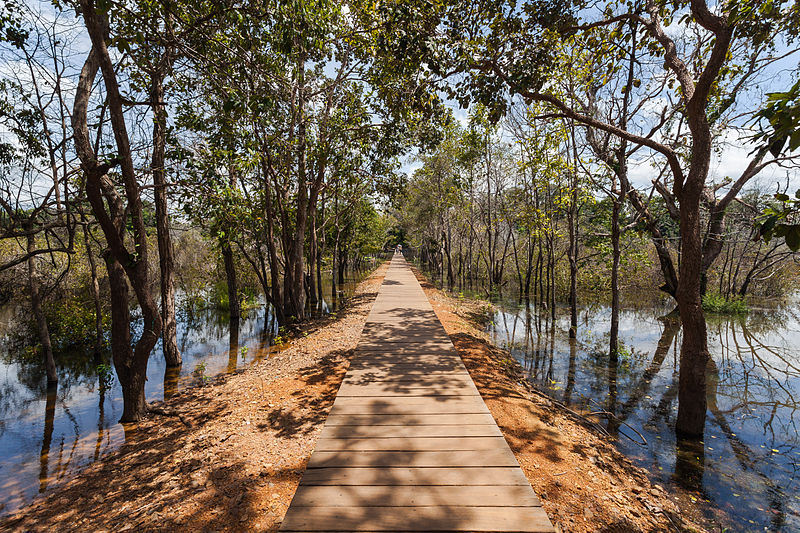empowering youth and tackling poverty in cambodia
Fifteen year old Sok collects facts in the back of her notebook. At the end of school she approaches the teacher’s desk to tell me that television was invented in 1922. Sok’s English is better than most other students, and she quickly realises my skepticism. She grabs her book and points to a scrawling script in the back – ‘See!’ It’s only our second lesson teaching her grade 8 class in Cambodia, and already, we’re the ones being schooled.
This is the point of our being here. Our team of six voluteers for Oaktree, an Australian anti-poverty organisation. From July 1 – 18, we’re in Cambodia as part of Oaktree’s International Youth Exchange, which trials a new model of partnership between local and international anti-poverty organisations.
The language and policy historically used by international organisations to tackle overseas poverty is arguably paternalistic. Phrases such as ‘third world’ conjure images of a dependent, less competent ‘other’, and this idea is reinforced by photos of passive, anonymous subjects. This discourse both reflects and perpetuates an unequal power relationship, with implications for aid efficacy. The use of resources provided by overseas actors is often prescribed, bypassing the nuanced needs, political situation and agency of affected people.
Oaktree wants to change this discourse. It’s entering into peer partnerships of mutual respect and learning with local NGOs. The aim is to share unique skills and perspectives that strengthen the capacity of people on the ground to face unique challenges, creating sustainable change.
My teammates and I will meet and workshop with Oaktree’s two partner organisations in Cambodia, the Youth Resource Development Project (YRDP) and Kampuchean Action for Primary Education (KAPE). Both organisations work to advance Cambodian education to break the poverty cycle, and we have much to learn from them.
This is all just theory to me until we land in Cambodia. The air is hot and sticky. The country is rich in natural resources; on long drives we follow rice fields that stretch, lush green, along red dirt roads. Despite this, it’s amongst one of the most impoverished, partly due to the Khmer Rouge genocide in the late 1970s. Severe poverty is concentrated to the countryside, where 2/3 of families experience food shortages depending on the season. In Cambodia’s bustling capital, Phnom Penh, it’s the poor infrastructure that’s telling, with shops made from tin sheets and large palm leaves. A three-hour drive from the city takes you to dry soil and people struggling to grow enough food.
Yet, this is only one side of a complex, hopeful country, something that the university students at YRDP are eager for us to know. There is agitation among Cambodian youth to discard a national identity defined by poverty and genocide. And amidst political, economic and social challenges, there is a deep passion and energy for social justice.
Despite the threat of punishment by the government (protesting in Cambodia can land you in prison), YRDP volunteers are taught critical thinking skills and to identify as political agents. In workshops, staff members challenge us to examine all sides of an issue, and students share knowledge about Cambodian corruption, political repression, unemployment, and environmental degradation.
The YRDP students show how this education pays off, with many running projects to address problems in their community. One volunteer runs a session with us on building positive cross-cultural relationships. Several years ago, he started a project that invites young people from different backgrounds to travel together to the Vietnamese border – cooperating to overcome cultural conflict. Another student tells me that he’s planning a campaign to reduce plastic bag usage. In the room next door, volunteers are casually organising a climate change conference that expects four hundred participants.
When they ask us about problems in Australia, one of our first responses is: ‘political disengagement.’ To YRDP members who have had to run to foreign embassies to escape police assault during protests, this might have sounded absurd.
Further south, in Kampong Cham, KAPE represents one of the most successful education projects run by a Cambodian NGO. The organisation’s Beacon School Initiative has introduced a new funding and accountability structure to three public schools. High quality education is delivered to disadvantaged students and the initiative has been recognised by the Cambodian government for its success. There is still a long way for Cambodian education to go, but KAPE’s initiative shows us the importance of carefully navigating complex situations with innovation and determination. When Sok announces to the class that her dream is to be a ‘leader in business and (her) community,’ I don’t doubt her.
From afar, it is easy to feel that solutions to poverty simply lack the initiative and resources to succeed. On the ground, it is so much clearer that complex situations demand time and nuanced solutions. Beyond learning skills from local organisations, it’s been the experience of befriending local people that has reignited my passion and determination. And though we hoped to teach our partners important skills, I leave humbled and awed.
When I am home, I google the invention of television: the idea was first conceived by a young student in 1922. I am reminded once more that the West still has learning to do.



So you spend a lot of words talking about how you’re empowering Cambodians by engaging in teaching despite having no qualifications and despite the fact that the only structural solution such an initiative would provide is CV bolstering. You talk about a girl who *shock horror* knows a fact that you don’t about a product which is just as ubiquitous in Cambodia as Australia. This leaves you awed.
Leave development to the locals, they’ve dealt with enough well-meaning Colonisers. If you gave local projects the money you spent on plane tickets over, meaningful change might have amounted. But then again, you can’t put charitable donations on your CV, can you?